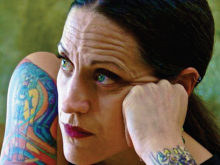addicts

DURING MY EARLY years of sobriety, I spent most Monday nights in a smoke-filled parish hall with some friends who were also sober alcoholics, drinking bad coffee. Pictures of the Virgin Mary looked down on us, as prayer and despair and cigarette smoke and hope rose to the ceiling. We were a cranky bunch whose lives were in various states of repair. There was Candace, a suburban housewife who was high on heroin for her debutante ball; Stan the depressive poet, self-deprecating and soulful; and Bob the retired lawyer who had been sober since before Jesus was born, but for some reason still looked a little bit homeless.
We talked about God and anger, resentment and forgiveness—all punctuated with profanity. We weren’t a ship of fools so much as a rowboat of idiots. A little rowing team, paddling furiously, sometimes for each other, sometimes for ourselves; and when one of us jumped ship, we’d all have to paddle harder.
In 1992, when I started hanging out with the “rowing team,” as I began to call them, I was working at a downtown club as a standup comic. I was broken and trying to become fixed and only a few months sober. I couldn’t afford therapy, so being paid to be caustic and cynical on stage seemed the next best thing. Plus, I’m funny when I’m miserable.
This isn’t exactly uncommon. If you were to gather all the world’s comics and then remove all the alcoholics, cocaine addicts, and manic depressives you’d have left ... well ... Carrot Top, basically. There’s something about courting the darkness that makes some people see the truth in raw, twisted ways, as though they were shining a black light on life to illuminate the absurdity of it all. Comics tell a truth you can see only from the underside of the psyche.
JIM BALMER, president of an addiction-recovery center called Dawn Farm in Ypsilanti, Michigan, has been an antiwar activist since the Vietnam days. His engagement with nonviolence has taken him to some unexpected places, from the antiabortion group Operation Rescue to working with addicts. Sojourners associate editor Elizabeth Palmberg interviewed Balmer early last year at the Consistent Life conference in Washington, D.C.
Elizabeth Palmberg: What was your work for peace during the Vietnam war?
Jim Balmer: I had been part of Detroit-area draft resistance. I went through almost all the conscientious objector status [process]. And it was 1970—what can I tell you? I was under the influence of substances one night, and I wrote the draft board in Pontiac, Michigan, and told them off; I just said, "come and get me." They never did. I suspect that, as the '70s progressed, they got more and more tired of putting us in jail.
The Detroit-Ann Arbor area was a hub for political activism. Students for a Democratic Society was founded there. YPFJ—Youth for Peace, Freedom, and Justice—there were all sorts of organizations. We would protest. The first time I got actually picked up was at a George Wallace rally—Wallace was a terrible, racist candidate from Alabama.
I started being interested in nonviolence. I was reading Mohandas Gandhi and Martin Luther King Jr., and I took King's nonviolence pledge when I was in high school.

Perhaps the last thing anyone would have expected to happen during the Reagan era was a renewal of interest in the idea of legalizing drugs.